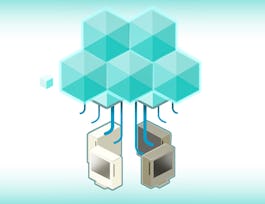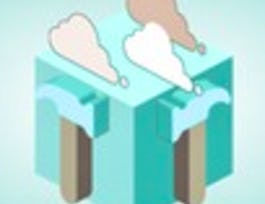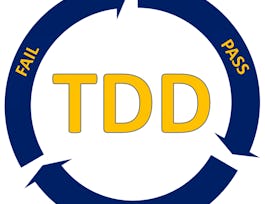Cloud computing systems today, whether open-source or used inside companies, are built using a common set of core techniques, algorithms, and design philosophies – all centered around distributed systems. Learn about such fundamental distributed computing "concepts" for cloud computing.


Cloud Computing Concepts: Part 2
This course is part of Cloud Computing Specialization
Taught in English
Some content may not be translated

Instructor: Indranil Gupta
32,967 already enrolled
Included with 
Course
(317 reviews)
Skills you'll gain
Details to know

Add to your LinkedIn profile
7 quizzes
Course
(317 reviews)
See how employees at top companies are mastering in-demand skills

Build your subject-matter expertise
- Learn new concepts from industry experts
- Gain a foundational understanding of a subject or tool
- Develop job-relevant skills with hands-on projects
- Earn a shareable career certificate


Earn a career certificate
Add this credential to your LinkedIn profile, resume, or CV
Share it on social media and in your performance review

There are 5 modules in this course
Lesson 1: To coordinate machines in a distributed system, this module first looks at classical algorithms for electing a leader, including the Ring algorithm and Bully algorithm. We also cover how Google’s Chubby and Apache Zookeeper solve leader election. Lesson 2: This module covers solutions to the problem of mutual exclusion, which is important for correctness in distributed systems with shared resources. We cover classical algorithms, including Ricart-Agrawala’s algorithm and Maekawa’s algorithm. We also cover Google’s Chubby support for mutual exclusion.
What's included
11 videos7 readings2 quizzes2 discussion prompts1 plugin
Lesson 1: Transactions are an important component of many cloud systems today. This module presents building blocks to ensure transactions work as intended, from Remote Procedure Calls (RPCs), to serial equivalence for transactions, to optimistic and pessimistic approaches to concurrency control, to deadlock avoidance/prevention. Lesson 2: This module covers how replication – maintaining copies of the same data at different locations – is used to provide many nines of availability in distributed systems, as well as different techniques for replication and for ensuring transactions commit correctly in spite of replication.
What's included
8 videos2 readings1 quiz1 discussion prompt
Lesson 1: We study the emerging area of stream processing, touching on key design aspects of Apache Storm. Lesson 2: We study how enormous graphs can be processed in clouds. Lesson 3: We study various types of networks/graphs that are both natural and artificial, and their surprising commonalities. Lesson 4: This module presents classical scheduling algorithms that have been used in operating systems since the inception of computers. We then cover two popular scheduling algorithms for Hadoop.
What's included
9 videos2 readings1 quiz1 discussion prompt
Lesson 1: When files and directories are stored/accessed over the network, it is called a distributed file system. This module covers the working of distributed file systems like NFS and AFS. Lesson 2: This module covers Distributed Shared Memory systems, their techniques, and pros/cons. Lesson 3: This module looks at the area of sensor networks, starting from what’s inside a sensor mote and how networks of them work.
What's included
6 videos2 readings1 quiz1 discussion prompt
Lesson 1: This module is a primer on basic security concepts, not just applied to distributed systems, but also more generally. We study various policies and mechanisms, including encryption, authentication, and authorization. Lesson 2: This module presents case studies of real datacenter outages, and attempts to draw lessons on how to prevent them and how to better prepare for them.
What's included
11 videos3 readings2 quizzes1 programming assignment3 discussion prompts1 plugin
Instructor

Recommended if you're interested in Algorithms

University of Illinois at Urbana-Champaign

University of Illinois at Urbana-Champaign

University of Illinois at Urbana-Champaign
Why people choose Coursera for their career




Learner reviews
Showing 3 of 317
317 reviews
- 5 stars
68.13%
- 4 stars
24.60%
- 3 stars
4.10%
- 2 stars
0.94%
- 1 star
2.20%
New to Algorithms? Start here.

Open new doors with Coursera Plus
Unlimited access to 7,000+ world-class courses, hands-on projects, and job-ready certificate programs - all included in your subscription
Advance your career with an online degree
Earn a degree from world-class universities - 100% online
Join over 3,400 global companies that choose Coursera for Business
Upskill your employees to excel in the digital economy
Frequently asked questions
Access to lectures and assignments depends on your type of enrollment. If you take a course in audit mode, you will be able to see most course materials for free. To access graded assignments and to earn a Certificate, you will need to purchase the Certificate experience, during or after your audit. If you don't see the audit option:
The course may not offer an audit option. You can try a Free Trial instead, or apply for Financial Aid.
The course may offer 'Full Course, No Certificate' instead. This option lets you see all course materials, submit required assessments, and get a final grade. This also means that you will not be able to purchase a Certificate experience.
When you enroll in the course, you get access to all of the courses in the Specialization, and you earn a certificate when you complete the work. Your electronic Certificate will be added to your Accomplishments page - from there, you can print your Certificate or add it to your LinkedIn profile. If you only want to read and view the course content, you can audit the course for free.
If you subscribed, you get a 7-day free trial during which you can cancel at no penalty. After that, we don’t give refunds, but you can cancel your subscription at any time. See our full refund policy.


